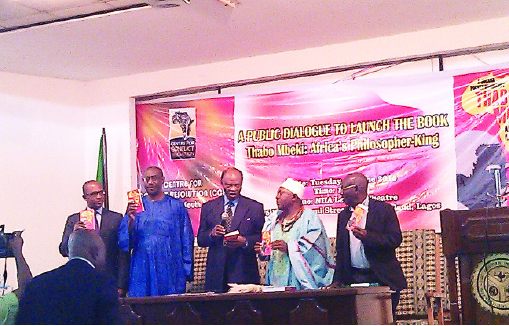Dr. Adekeye Adebajo has said that former South African President Thabo Mbeki is a philosopher-king while his Nigerian counterpart, Olusegun Obasanjo, is a farmer-soldier.
Adebajo, who is the executive director of the Centre for Conflict Resolution, Cape Town, South Africa, was responding to questions and comments during the launch of a mini-biography he penned on Mbeki entitled Thabo Mbeki: Africa’s Philosopher-King (Jacana) at the Nigerian Institute of International Affairs (NIIA) in Lagos on Tuesday, June 21.
“What I was trying to say in terms of giving Mbeki credit is that if we look at NEPAD…I think in the AU (African Union), the APRM, all those documents, we can say that the credit is shared, but Mbeki’s fingerprints were all over NEPAD. He wrote, directly, himself parts of the NEPAD document, according to people I have talked to and that is where I was giving him credit.
“So, for me, while Mbeki would be a philosopher-king, the person he works most closely with, our own President Obasanjo, I describe often as a farmer-soldier rather than a philosopher-king. And that is in no way trying to denigrate our former President who has his own, I think we call it native intelligence,” said Adebajo, who has written four other books and co-edited many others.
Drawing a contrast between the South African and Nigerian economies, Adebajo, who has lived in both countries, said that South Africa might have a white-dominated economy with world class infrastructure. “Things work over there, anybody that comes over to South Africa can see it, and in the 22 years that blacks have been in power, that infrastructure has been improved. They have maintenance culture as well.”
He said it is important to contrast that with what obtains in Nigeria.
“The Ajaokuta Steel complex was commissioned in the early 1970s when I was a very young boy. We have not seen that produce any element of steel. We sit here today and there is a generator running outside. We have not been able to generate enough power within this country over the last four decades, as brilliant as we are. We have produced more intellectuals than South Africa has. We have a population that is three times larger than South Africa’s, but we generate much less electricity than South Africa.
“So, if, according to the young woman, you want me to come home, I think it is important we try to fix some of these things and then we can do whatever we want to do together,” he added.
On the question of whether leadership is born or nurtured, he said he was not very sure of the answer, but pointed to institutions like the Thabo Mbeki Leadership Institute in South Africa that brings Africans from all over the continent and trains them in leadership, management and other techniques.
“Those things are important, but I think it is also important that we have leaders that can rule by example and that we don’t just see leadership within the political system but in business, in civil society. We are all leaders in our own field and I think these things are too important to leave to reckless politicians, which is what we have had over the last 40 years or so. So we have to become leaders ourselves and I think there are some examples.
“If we look at someone like Ngozi Okonjo-Iweala, I am not talking about her second coming, but in the first administration when she worked to cancel that debt. That was a sign of incredible, intellectual and political leadership, using the extensive network that she built up at the World Bank and a first class education to really do a lot of good work and fight battles to build institutions,” he said.
He concluded that we need more people that are able to do that, despite the political system.
It was a well-attended event despite the heavy Lagos traffic, which delayed the start by at least one hour, with the Chairman, Ambassador Oladapo Fafowora; reviewer, Professor Adele Jinadu; HRH Ambassador Christopher Ariyo and President, Oxford/Cambridge Club, Nigeria, Akinsola Akani, in attendance.

- Advertisement -
- Advertisement -
Must Read
Japada: Not to Naija, are you mad? (2)
Japada: Not to Naija, are you mad?
By Taju Tijani
Remi poured the Jamaican rum in...












